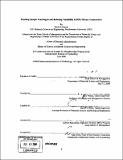| dc.contributor.advisor | Roy Welsch and Darrell J. Irvine. | en_US |
| dc.contributor.author | Penake, David A. (David Allen) | en_US |
| dc.contributor.other | Leaders for Manufacturing Program. | en_US |
| dc.date.accessioned | 2007-02-21T13:09:13Z | |
| dc.date.available | 2007-02-21T13:09:13Z | |
| dc.date.copyright | 2006 | en_US |
| dc.date.issued | 2006 | en_US |
| dc.identifier.uri | http://hdl.handle.net/1721.1/36221 | |
| dc.description | Thesis (S.M.)--Massachusetts Institute of Technology, Dept. of Materials Science and Engineering; and, (M.B.A.)--Massachusetts Institute of Technology, Sloan School of Management; in conjunction with the Leaders for Manufacturing Program at MIT, 2006. | en_US |
| dc.description | Includes bibliographical references (p. 94-99). | en_US |
| dc.description.abstract | The Broad Institute is a world leader in genomic sequencing. The Institute gained prominence during the Human Genome Project and has continued to be the nation's leading public laboratory for genomic sequencing projects. The Broad Institute has done this by taking advantage of economies of scale, rapid process innovation, and new process implementation. Strong execution has made The Broad Institute the lowest cost and highest quality sequencing operation in the country. As biological science evolves, The Broad Institute will focus on low-volume, highly targeted areas of a genome rather than high-volume, full genome sequencing projects. In order for the Institute to maintain high-quality output at low cost, it must change its operations strategy from mass production to flexible, lean production. The operations organization has begun the lean production journey by hiring operations focused managers and initiating a Six Sigma program to utilize their employees to innovate and optimize processes. This effort has been supplemented with 5S (systematic organization) and information systems that improve communication between groups. | en_US |
| dc.description.abstract | (cont.) This thesis will focus on engineering and management issues relating to The Broad Institute and its quest to maintain quality and cost leadership among genomic sequencing laboratories. Specifically, the thesis will focus on the following items; * Preventing organism sample swaps by implementing operations changes that minimize operator error and provide electronic sample tracking through the use of Datamatrix (two dimensional) barcode technology. * Minimizing inherent process variability by increasing reagent inventory turnover and eliminating the use of expired chemicals. * Increasing the flexibility of the production process to easily handle high-mix, low-volume projects, such as the Cancer Human Genome Project. | en_US |
| dc.description.statementofresponsibility | by David A. Penake. | en_US |
| dc.format.extent | 99 p. | en_US |
| dc.language.iso | eng | en_US |
| dc.publisher | Massachusetts Institute of Technology | en_US |
| dc.rights | M.I.T. theses are protected by copyright. They may be viewed from this source for any purpose, but reproduction or distribution in any format is prohibited without written permission. See provided URL for inquiries about permission. | en_US |
| dc.rights.uri | http://dspace.mit.edu/handle/1721.1/7582 | |
| dc.subject | Materials Science and Engineering. | en_US |
| dc.subject | Sloan School of Management. | en_US |
| dc.subject | Leaders for Manufacturing Program. | en_US |
| dc.title | Enabling sample tracking in and reducing variability in DNA library construction | en_US |
| dc.title.alternative | Enabling sample tracking in library construction | en_US |
| dc.type | Thesis | en_US |
| dc.description.degree | M.B.A. | en_US |
| dc.description.degree | S.M. | en_US |
| dc.contributor.department | Leaders for Manufacturing Program at MIT | en_US |
| dc.contributor.department | Massachusetts Institute of Technology. Department of Materials Science and Engineering | |
| dc.contributor.department | Sloan School of Management | |
| dc.identifier.oclc | 76907446 | en_US |
